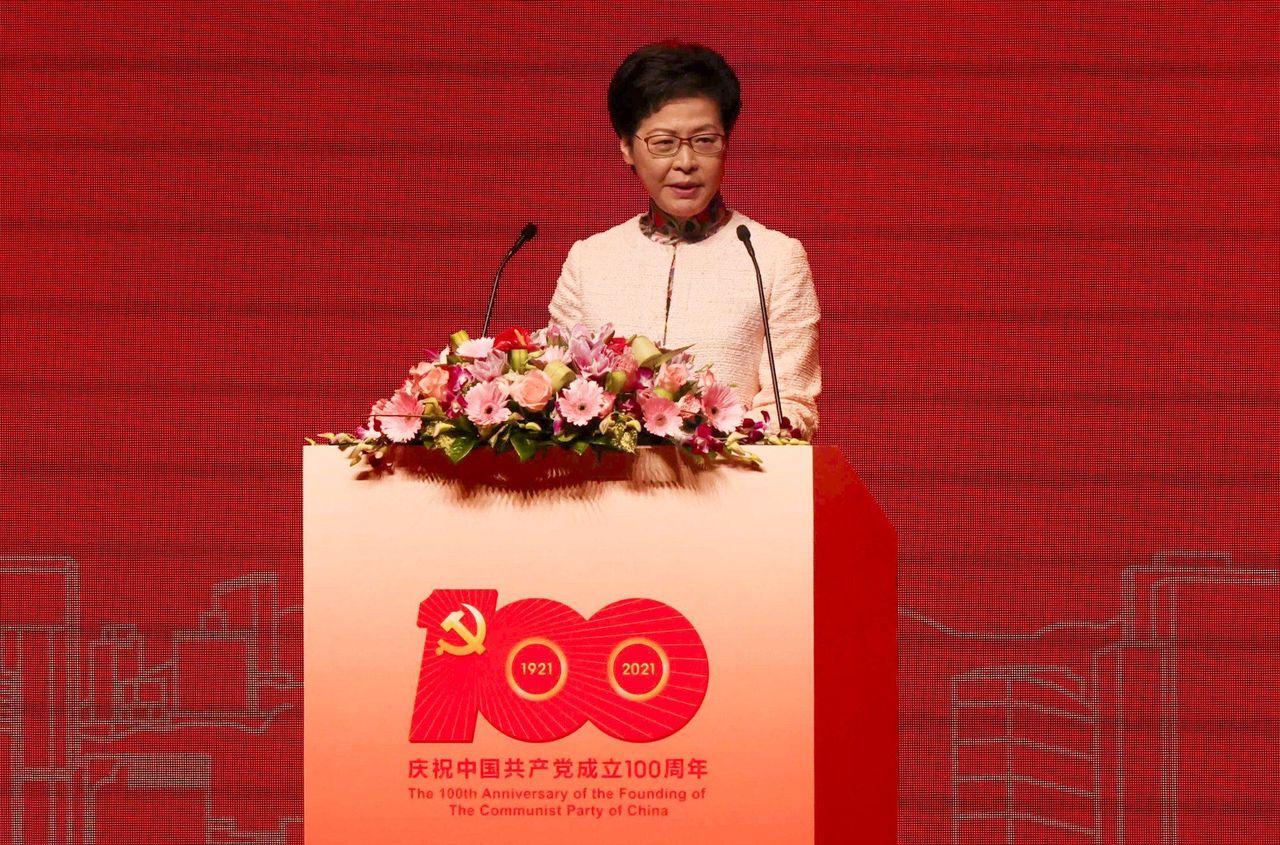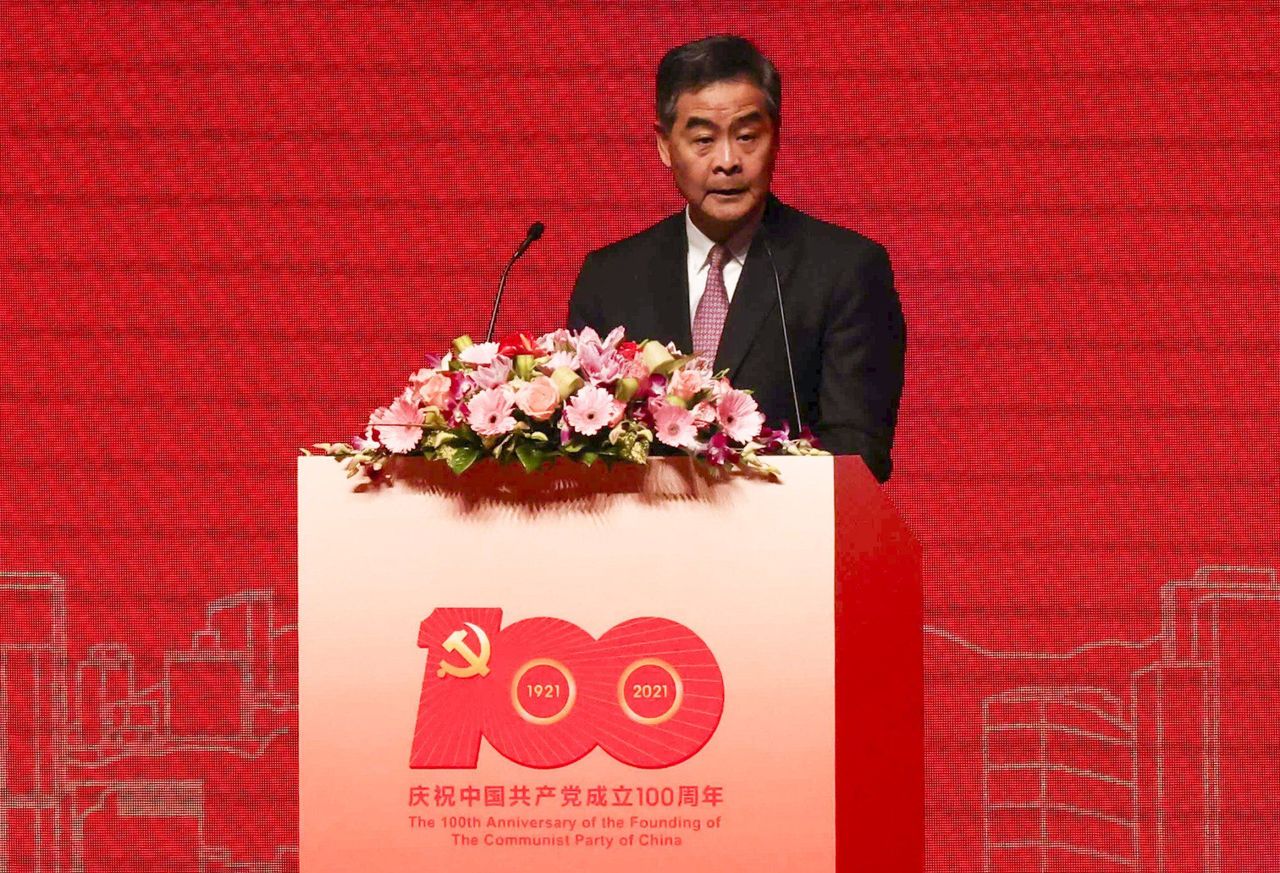Hong Kong News

Communist Party defender of Hong Kong’s ‘one country, two systems’
Beijing’s top representative in Hong Kong has for the first time described in unequivocal terms the Communist Party as the architect, leader and defender of the “one country, two systems” governing principle, slamming those calling for an end to its rule as the “real enemies of the city”.
At a forum to mark the party’s 100-year anniversary, Luo Huining, director of the central government’s liaison office in Hong Kong, on Saturday set out the most comprehensive statement yet on the ruling party’s authority over the city since it was returned from British rule nearly 24 years ago.
“To advance the cause of one country, two systems, it is imperative to uphold the leadership of the Communist Party of China … The party is the true pioneer, leader, practitioner and defender of the cause of one country, two systems,” he told high-level officials, businessmen and lawmakers.
“No one better appreciates the value of one country, two systems or is more committed to the original aspiration of this policy than the party,” he said of the governing principle first envisioned by the late paramount leader Deng Xiaoping as a way to retain Hong Kong’s capitalistic system while returning to Chinese rule.
 Chief Executive Carrie Lam delivers remarks at the forum. In a rare
move, she highlighted both the role of the central government and the
party in Hong Kong’s progress.
Chief Executive Carrie Lam delivers remarks at the forum. In a rare
move, she highlighted both the role of the central government and the
party in Hong Kong’s progress.
Luo went on to identify the enemies of the city whom he said were trying to bring an end to one-party rule and at the same time destroy the one country, two systems model.
They were “those who clamour for ‘an end to one-party rule’, reject the leadership of the party over the cause of one country, two systems, those who attempt to use Hong Kong as a geopolitical pawn to contain China as well as a bridgehead for infiltrating the mainland”.
Such forces posed “existential threats to the foundation of one country, two systems”, he said, warning: “They are the real enemies of Hong Kong’s prosperity and stability.”
Luo made it a point to stress the city’s high degree of autonomy as underscored by the one country, two systems model, rhetorically asking his audience if there were any other “ruling party in the world that allows the coexistence of two different social systems within one country”.
“This great model of one country, two systems subverted the conventional wisdom that lost territories could only be reclaimed by force. It embodies the political wisdom of the party,” he said.
Luo’s speech, coming nearly a year after Beijing imposed a national security law on Hong Kong to prohibit acts of secession, subversion, terrorism and collusion with foreign forces, could be read as a sign the central government was still anxious to plug loopholes in the system to stress its dominance, analysts said.
In the wake of a series of drastic changes to the political system, the speech made clear the ruling party was firm, open and unequivocal over its role in Hong Kong, a sharp departure from previous decades, they said.
The forum came a week after Hongkongers marked the June 4 anniversary of the 1989 Tiananmen crackdown by holding small pockets of protest, despite a ban on the annual Victoria Park vigil.
The Hong Kong Alliance in Support of Patriotic Democratic Movements of China, the organiser of the city’s annual candlelight vigil, has been in the hot seat over its long-standing call for an end to China’s one-party rule, with the national security law now in effect.
Pro-establishment figures and analysts said that while Luo’s speech was significant in clearing up any previous doubts about the authority of the party over the city, the alliance might also be just one of the targets. Foreign powers which thought they could still hold sway in Hong Kong, they said, were also served a strong reminder by his speech.
For now, pro-government figures said they believed pressure would mount on the city’s administration to take action against the alliance or others who ignored the firm message about the centrality of one-party rule.
Asked after the forum whether the alliance could be outlawed, Tam Yiu-chung, Hong Kong’s sole delegate to the National People’s Congress Standing Committee, said: “If any organisation or individual has broken the law, the authorities will handle them in accordance with the law … I think it’s important that Luo specified the problematic slogans or acts that should not be used or done.”
Former security chief Regina Ip Lau Suk-yee, who advises the city leader on the de facto cabinet, the Executive Council, said: “Under the national security law, it is problematic if you are really trying to bring an end to the one-party rule and subvert the nation. I call on residents not to chant such slogans.”
But Chow Hang-tung, the alliance’s vice-chairwoman, said while the group had “made plans” to prepare for escalating threats, disbanding or abandoning its operational goal to end one-party rule was not among the options.
The symposium on the party centenary, co-organised by Beijing’s four agencies in the city – the liaison office, national security office, foreign office and garrison – as well as the Hong Kong government, was the first time that mainland authorities had organised a high-profile, local forum mark an anniversary.
Analysts said the gesture showed Beijing was keen to emphasise its authority, or “comprehensive jurisdiction” over the city, as well as to showcase the party’s confidence in its legitimacy in ruling China, now the world’s second-largest economy.
In June 2011, Beijing authorities in Hong Kong also organised a celebratory ceremony, but there was no record of top local officials being in attendance.
In his speech, Luo said that while one country, two systems had been a success since the handover, Beijing was driven to impose the security law by anti-China forces threatening to derail the principle.
Under the propaganda of those forces, misconceptions about Hong Kong’s governance arrangements have become ingrained in the city, according to Luo.
“The turbulence over the extradition bill in 2019, in particular, seriously jeopardised the rule of law … [but the party] foiled the plot of anti-China forces to stage a ‘colour revolution’. The practice of one country, two systems was subsequently returned to the correct path,” he said in a reference to the Eastern European uprisings in the early 2000s.
The event on Saturday was held exactly two years after police and demonstrators clashed outside the Legislative Council complex on June 12, 2019, in the opening days of the anti-government protests.
Luo also said in his speech that for the continuation of one country, two systems, authorities must keep improving various systems and mechanisms.
In a reference to Beijing’s drastic changes to Hong Kong’s election system earlier this year, Luo said: “Facts will continue to prove that the one country, two systems framework, with its loopholes plugged, deficiencies addressed and different interests balanced, will better safeguard national sovereignty.”
The senior official also said that as the nation continued to grow, Hong Kong compatriots would have a stronger sense of national identity and pride, as well as an “improved acknowledgement” of the party.
Hong Kong leader Carrie Lam Cheng Yuet-ngor also spoke at the forum, and in a rare move highlighted how it was not just the central government that led the mainland and the city in the 1997 reunification and socio-economic progress, but the party as well.
“During the Sino-British diplomatic negotiations on Hong Kong’s future [in the 1980s], the party and the central government’s fundamental position was firm and unswerving – it was that national sovereignty was not up for discussion, it could not be separated from the right to govern,” she said.
“Under the party’s leadership, the central government has strictly followed the national constitution and the Basic Law … As the chief executive, I’ve deeply felt the party’s confidence in the strength of its own systems.”
Former Hong Kong leader Leung Chun-ying, now a vice-chairman of the Chinese People’s Political Consultative Conference, the nation’s top advisory body, argued in his speech the party had established “classic examples” about the rule of law and democracy, as it implemented the one country, two systems principle.
Leung said the Basic Law mini-constitution was “the highest manifestation of the rule of law” as it laid down the foundation of the party to authorise Hong Kong to be governed by Hong Kong people after 1997.
 In his remarks at the forum, former Hong Kong leader Leung Chun-ying
said the drafting of the Basic Law was ‘the highest manifestation of
democracy’.
In his remarks at the forum, former Hong Kong leader Leung Chun-ying
said the drafting of the Basic Law was ‘the highest manifestation of
democracy’.
Leung, a former secretary general of the Basic Law Consultative Committee, also said the drafting process of the document in the 1980s was “the highest manifestation of democracy”.
He noted that the committee, which consisted of 180 members from all walks of life, had consulted the public on what the Basic Law should include, and millions of copies of consultative documents were given out.
“The process lasted for more than four years,” he said. “Until now, it was still the longest, largest and most broadly-representative consultative exercise in Hong Kong.”
China will mark the 100-year anniversary of the party on July 1, with a series of events around the nation.











